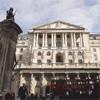Bank of England keeps main interest rate unchanged
Bloomberg

refid:12040271 ilişkili resim dosyası
The nine-member Monetary Policy Committee, led by Governor Mervyn King, kept the interest rate at 0.5 percent on Thursday and refrained from expanding its asset-purchase plan. Gordon Brown’s government has authorized the bank to spend a total of 150 billion pounds.
Britain’s recession probably eased in the second quarter and the economy may now be stagnating, the National Institute of Economic and Social Research said this week. King says evidence from the bank’s program seems "positive" so far, though the credit squeeze remains a threat to the recovery.
"The case has been made to stop and wait and see for a bit," said Colin Ellis, an economist at Daiwa Securities SMBC Europe and a former official at the central bank. "There are signs the economy is bottoming out and the mood music is getting better."
Central banks around the world have cut rates close to zero and bought bonds to aid growth. The European Central Bank plans to start buying 60 billion euros) of covered bonds this month, and the Bank of Japan may extend its emergency credit programs as soon as next week. Last month, the Federal Reserve said it will let one emergency-lending program expire this year, and trim two others. Government bonds are still close to where they were before it started. The yield on the benchmark 4.5 percent gilt due March 2019, which fell in the immediate aftermath of the March 5 start date, was at 3.59 percent today. It was 3.62 percent before the plan’s announcement.
Britain’s economy may be helped by a global rebound. The International Monetary Fund on Wednesday said the country will return to growth next year, forecasting an expansion of 0.2 percent after a contraction of 4.2 percent this year. GDP fell 2.4 percent in the first quarter, the most since 1958.
For now, Prime Minister Brown is struggling to restore his political fortunes after four quarters of economic contraction. He must call an election within the next year, and his ruling Labour Party had the support of 25 percent of voters in a ComRes survey in the Independent on June 30. That compares with 36 percent for the opposition Conservatives.
While a quarterly survey of lenders showed on July 2 that they expect to increase loans in the next three months, mortgage approvals rose less than economists forecast in May. Factory output fell for the first time in three months and Diageo, the world’s biggest liquor maker, plans to cut 500 jobs in Scotland.
Bank of England markets director Paul Fisher said last month that "we should not be complacent" as problems at banks keep threatening the economy. King said he felt "more uncertain now than ever."
Printing money may also fuel inflation, which slowed less than economists forecast in May to 2.2 percent, complicating the Bank of England’s task. The bank, which targets an inflation rate of 2 percent, will release its next quarterly forecasts on August 12.
















